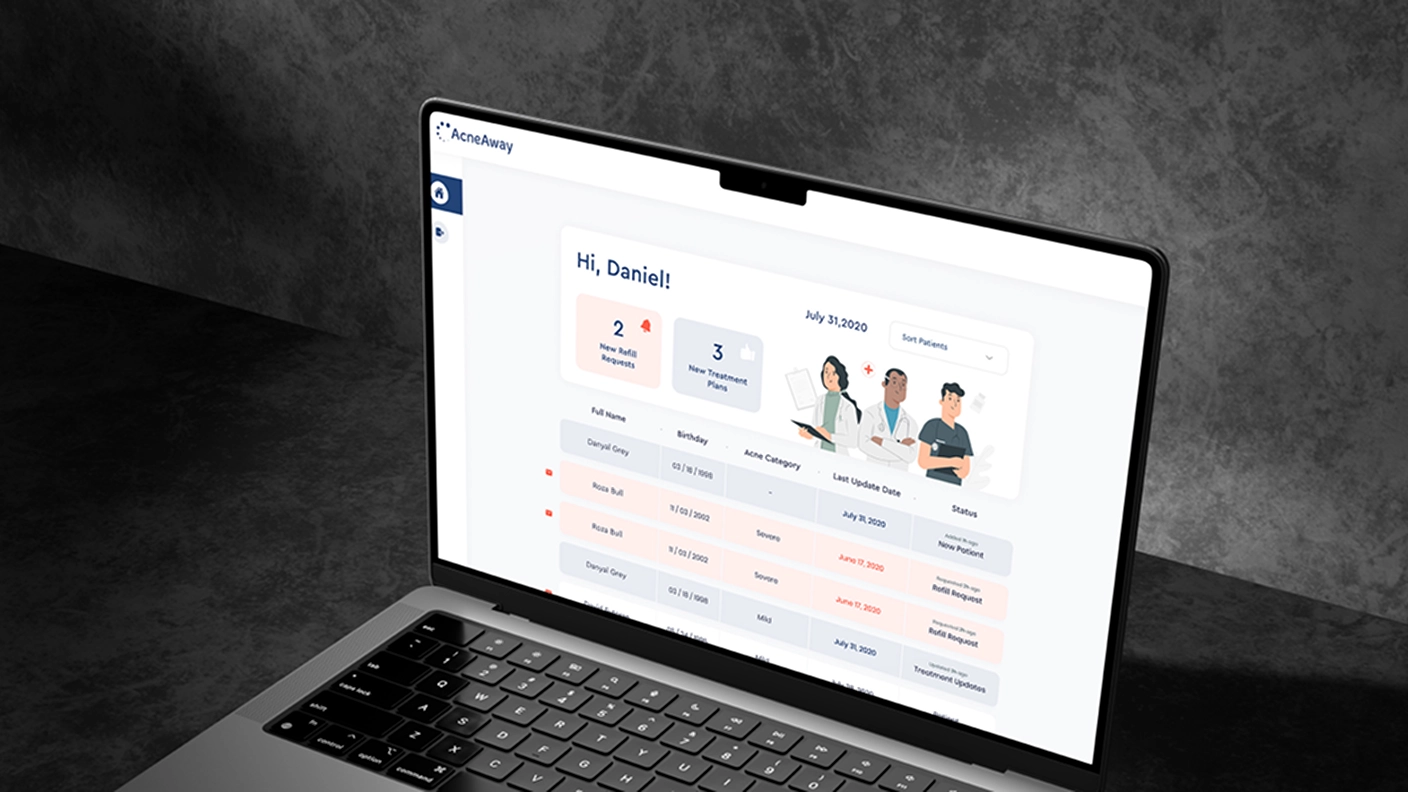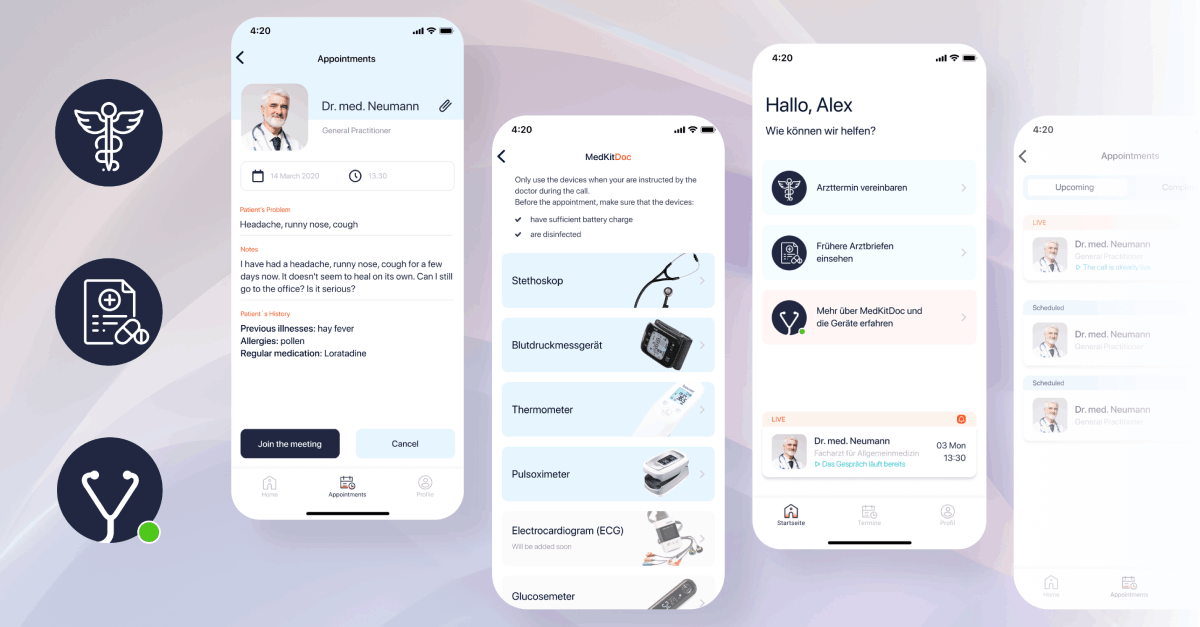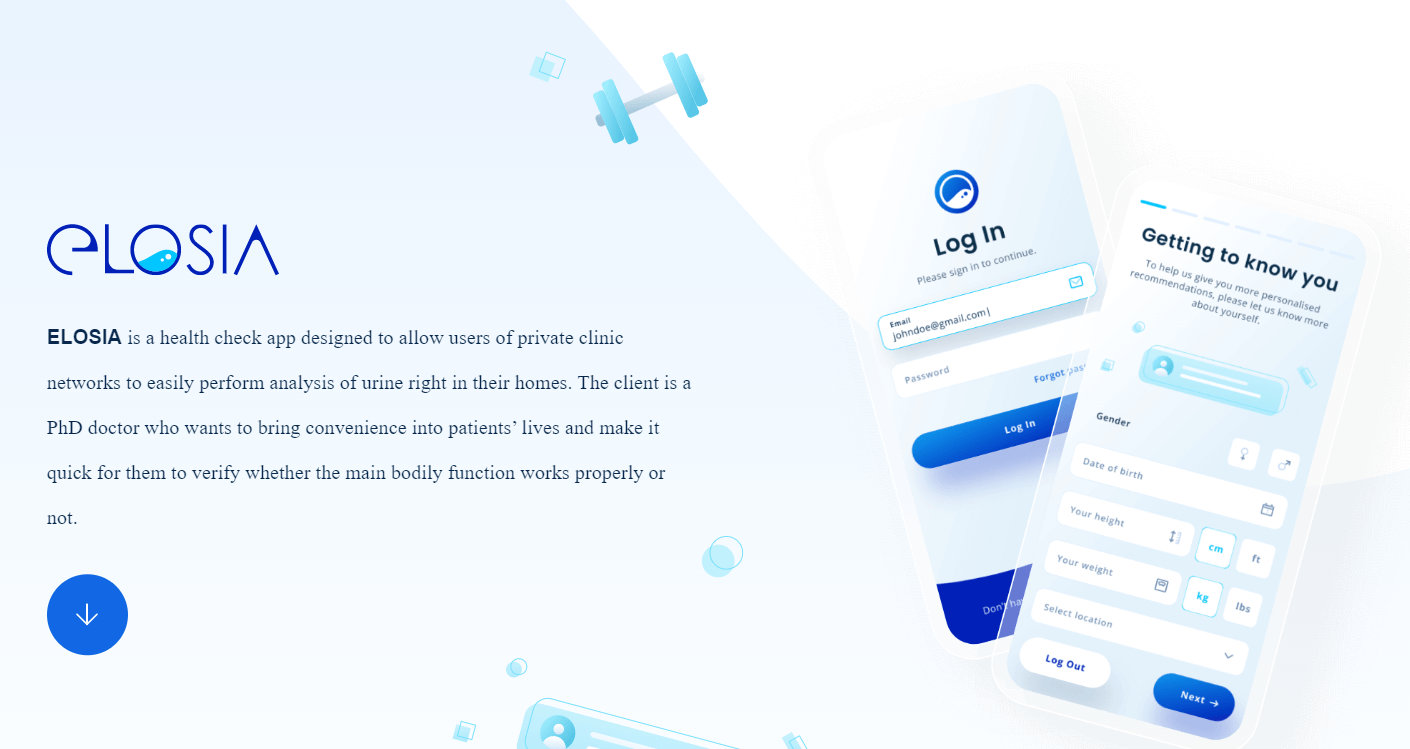With continuous technological advancements and digitization, smartphones, and other devices have become a perfect platform for promoting a healthy lifestyle and seeking timely medical attention. Innovative healthcare apps have made it more convenient for patients to track their health progress, access medical care, and manage their appointments, prescriptions, and medical records. Healthcare professionals can now concentrate on providing quality patient care thanks to streamlined workflows and automated manual tasks.
So, it’s no wonder that more and more healthcare vendors and organizations are turning to medical app development companies to create effective and user-friendly applications. In this article, we uncover the development process and best practices for healthcare app development.
 $240.9 billion
$240.9 billion
The global digital health market size was estimated at $240.9 billion in 2023.
 $81.17 billion
$81.17 billion
The U.S. digital health market size was estimated at $81.17 billion in 2023.
 $787.1 million
$787.1 million
The global healthcare chatbots market was valued at $787.1 million in 2022.
What is Healthcare App Development?
Healthcare app development refers to the process of designing and building web or mobile applications for medical care, fitness, and wellness. Medical software development creates an entire ecosystem where medical professionals can provide better care and patients can receive it more easily.
Healthcare apps are created both for patients and medical professionals. The software helps patients manage their health, monitor diseases, and get the required treatment in a timely manner. Meanwhile, doctors and nurses can use medical apps to manage their workflows more efficiently and provide quality care.

-
Healthcare Apps for Patients:
- Appointment scheduling and reminder apps;
- Medication tracking apps;
- Self-diagnosing apps;
- Women’s health apps;
- Telehealth apps;
- Mental health apps;
- IoMT (Internet of Medical Things);
- Fitness and wellness apps.
-
Healthcare Apps for Medical Providers:
- Remote patient monitoring apps;
- EHR (electronic health records) apps;
- Telemedicine apps;
- Medical reference apps;
- Hospital ERPs (enterprise resource planning);
- Appointments management apps;
- Inventory management apps;
- Billing apps;
- Practice management apps.
Maximize your performance and patient care with customized medical software.
Book a callA 5-Step Process for Building a Healthcare App
-
1 Planning
Planning is the first and most crucial step, as it will determine all your subsequent actions and decisions throughout the medical app development process. Meticulous planning and research are also an excellent way to save money on unnecessary features or trying to enter an oversaturated niche. Follow the below listed steps:
- Identify your future app’s type, desired features, budget, goals, etc.
- Determine your target audience, which may include medical professionals, hospital administrative staff, labs, health insurance companies, patients, etc.
- Conduct comprehensive market research to study your competitors and niche and understand user preferences.
- Find an open niche you can fill and the existing need you can address. Set clear goals and measurable objectives.
-
2 Design
A functional yet appealing healthcare app design is vital to make your app stand out in a competitive market. Healthcare apps are intended for people of different age groups, with different tech skills, and with different conditions (including people with disabilities). Therefore, UI/UX designers should focus on creating a simple, highly intuitive, and user-friendly design to ensure a smooth user experience.
Additionally, remember that medical professionals may need to use the software in high-pressure situations. Create easy-to-understand and easy-to-use navigation and workflows to suit their professional needs. Integrate various features and functionalities to streamline everyday processes, including data entry, prescription management, and appointment scheduling.
Partnering with an experienced healthcare software development company will help you create user-centric design and enhance user engagement and satisfaction, bringing success to your app.
-
3 Building the Infrastructure
A scalable and robust infrastructure is the backbone of your healthcare app, ensuring its performance and reliability. Make sure to check the following:
- Hosting: Select a secure hosting environment that provides backups and disaster recovery plans, such as HIPAA-compliant cloud services.
- Scalability: To facilitate future scalability in case of potential user and data growth, use load balancing, scalable databases, and caching.
- Access controls: Limit access to patient data and prevent unauthorized entry by setting up role-based access controls.
- Data encryption: Secure the data at rest and in transit with strong data encryption (SSL/TLS).
- Security audits: Ensuring high patient data security and regulatory compliance levels is vital in the medical app domain. Therefore, you must conduct regular vulnerability assessments and security and compliance audits.
-
4 Development and Quality Assurance
Meticulous development and testing ensure the success and seamless operation of your future healthcare app.
- Skilled development team: Hire software developers with in-depth expertise in the required programming languages, frameworks, databases and extensive experience in healthcare software development.
- Agile methodology: Adopting agile development methodologies allows the team to break the development process into short sprints for proactive iterations and receive feedback from stakeholders for continuous improvement.
- Prototyping: Before starting development, build prototypes to visualize the app’s flow and functionality and clarify expectations and requirements.
- Testing: Thoroughly test your app for security, performance, functionality, and compatibility with different devices using integration testing, unit testing, and user acceptance testing.
- Bug tracking: Set up a system for tracking and resolving bugs and any issues arising during testing to ensure all bugs are resolved before the app launch.
- User training: Prepare training and documentation to help your future users navigate the app and use its full potential in their daily workflows. User training is essential for apps with complex functionality targeting medical professionals.
-
5 Launch and Post-Launch
The launch of a healthcare app means publishing it on the Apple Store or Google Play Market. Following a comprehensive marketing strategy will help you successfully launch your app, present it to your target audience, and increase user adoption rates. Consider partnering with medical institutions and healthcare practices to promote your application and reach a broader audience.
However, the work doesn’t stop when the app is released. To stay competitive in the healthcare app landscape, you need to:
- assess the app performance;
- provide post-launch maintenance;
- fix bugs;
- add new features or update the existing ones;
- update the app according to user feedback.
Real-Life Cases of Medical Software Development by Interexy
AcneAway
AcneAway is a telemedicine web app designed to help people worldwide easily connect with a doctor online, get diagnosed, and receive personalized dermatological treatment. Our team played a key role in developing a seamless, AI-powered patient experience with an integrated chatbot for effortless appointment booking and guidance. Leveraging React, Redux, Node.js, and AWS, we delivered a scalable, high-performance solution with a smooth UI and secure infrastructure.

Physact
Physact is a digital health platform designed to help patients manage mild depression through physiotherapy under doctor supervision. Interexy developed a mobile app for patients and a web platform for physicians, creating a seamless system for exercise tracking, progress monitoring, and direct communication. Using React, Nest, and AWS, we built a secure, user-friendly solution that supports video-guided exercises, weekly health assessments, and real-time doctor insights.

Looking for a reliable partner to create an effective healthcare app for your organization?
Book a callFAQs about App Development for Healthcare
-
How to develop an app for healthcare?
The process of app development for healthcare involves several key steps: market research, defining features, choosing the right technology stack, ensuring compliance with regulations, and conducting thorough testing. Healthcare app development requires a focus on security, interoperability, and usability to meet industry standards. Whether you’re working on health app development for patients, doctors, or healthcare providers, a structured approach to medical app development ensures a successful product.
-
Are health apps subject to HIPAA?
Yes, many health apps are subject to HIPAA regulations if they handle protected health information (PHI). Healthcare application development must comply with HIPAA when the app processes, stores, or transmits patient data on behalf of covered entities like hospitals or insurance providers. However, not all health-related apps fall under HIPAA – compliance depends on the app’s purpose and data usage.
-
How do I make my app HIPAA compliant?
To ensure HIPAA compliance in app development for healthcare, you must implement strong data encryption, secure user authentication, and access control measures. Healthcare app development should also include audit logs, regular security assessments, and HIPAA-compliant cloud storage solutions. Additionally, working with legal and compliance experts during medical app development helps avoid regulatory risks.
-
Do health apps make money?
Yes, health apps can be profitable through various monetization models. In health app development, common revenue streams include subscription plans, in-app purchases, freemium models, partnerships with healthcare providers, and insurance reimbursements. A well-planned app development healthcare strategy can ensure both user value and financial success.
-
How much does it cost to develop a healthcare app?
The cost to build a healthcare app depends on factors such as complexity, features, platform (iOS, Android, or both), and compliance requirements. Basic healthcare app development can cost around $40,000–$100,000, while advanced medical app development with AI, telemedicine, or EHR integration can exceed $300,000. The total cost of healthcare application development also varies based on the development team’s location and expertise.






